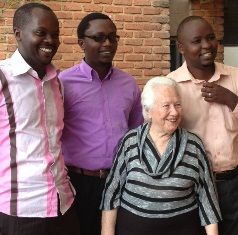USC Shoah Foundation joins peace-building initiative in Rwanda

Association of Holocaust Organizations convenes at the Institute
Winter seminar focuses on future of survivor testimony
Representatives from more than 30 Holocaust museums and centers in the United States and Canada came to Los Angeles this week for the 2013 Association of Holocaust Organizations (AHO) Winter Seminar, hosted for the first time by USC Shoah Foundation – The Institute for Visual History and Education.
‘Lost Music of the Holocaust’ Performed by Survivor’s Grandson
June 18 saw the U.S. premiere of a set of piano variations on a Polish patriotic theme composed in the Dachau concentration camp by prisoner of war Leon Kaczmarek (1903–1973). Kaczmarek’s composition was performed by 17-year-old pianist Nicholas Biniaz-Harris, winner of the National Symphony Orchestra’s 2013 Young Soloists’ Competition.
Monthly Institute Visit: RSVP to Attend
You’re invited to the USC Shoah Foundation!
Free and open to the public, our monthly tours give visitors a chance to explore the life stories of survivors and witnesses of the Holocaust and other genocides and to discover how their memories are being used to overcome prejudice, intolerance, and bigotry.
Rwandan Testimonies Add 500 New Terms to Visual History Archive’s Thesaurus
Testimonies of survivors and witnesses of the 1994 Rwandan Tutsi Genocide added to USC Shoah Foundation’s Visual History Archive have resulted in 500 new search terms for the archive’s indexing system.
The index is a controlled vocabulary of more than 50,000 terms that make up the Shoah Foundation’s Thesaurus and that allow detailed searching of the testimonies in the archive.
When the Japanese surrender on September 2, 1945, there are 25,000 to 30,000 Jews in China, 17,000 of them in Shanghai. The Shanghai ghetto is only opened with the arrival of an American goodwill mission on September 3, 1945. Communists and Nationalists race to establish positions in Japanese-occupied areas of China. During 1945-1947, Manchuria is under Soviet occupation, and Jewish community leaders of Harbin are arrested and sent to the Soviet interior. Chinese Nationalists and Communists sign a truce on January 10, 1946.